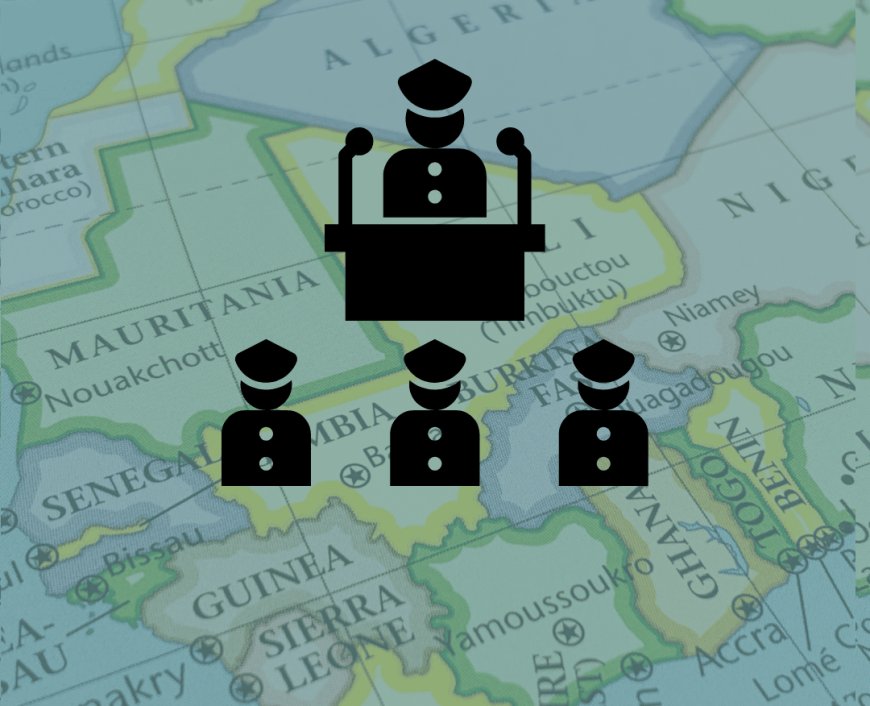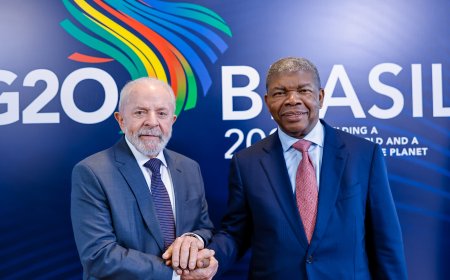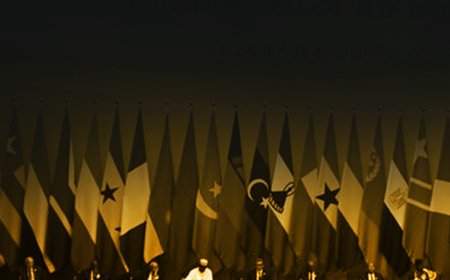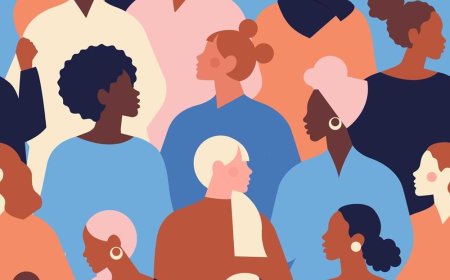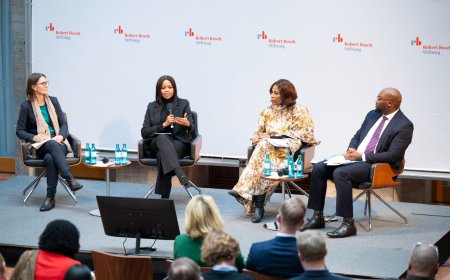This article is part of the BRICS thought leadership series, published by APRI in collaboration with the University of Johannesburg. It explores key themes from the 16th BRICS Summit and the group's broader initiatives. The series is edited by Ada Mare, Bhaso Ndzendze, Serwah Prempeh.
Introduction
The resurgence of military coups in Africa has brought the continent to the forefront of global democratic evaluation. As various states and non-state actors in Africa, including the Economic Community of West African States (ECOWAS) and the African Union (AU), have concentrated on denouncing the resurgence of coups, it is also crucial to comprehend the stance of Africa's external partners, including the US, the EU and emerging global power structures such as BRICS, given their profound involvement and influence in the political economy of several African countries.
The increasing influence of BRICS in Africa underscores the importance of understanding their responses to political and economic events on the continent. A testament to the relationship between BRICS and African nations is the recent inclusion of Ethiopia and Egypt among the six new member countries at the 15th BRICS Summit held in Johannesburg, South Africa, 2023. Also, the 2024 BRICS Summit, hosted in Kazan, Russia, raised concerns due to the ongoing Russia-Ukraine war and the intricate global geopolitical dynamics surrounding it. Tension in the Middle East and the position of global powers have also affected Russia’s identity in global power politics. However, in the context of Africa, the 2024 BRICS Summit identified three key areas of cooperation: namely politics and security, economy and finance, and cultural and humanitarian ties. As matters of military coups and democratic stability fall under the purview of politics and security, this brief raises concerns about BRICS' response to Africa's (in)security crises, particularly the resurgence of military coups and their implications for both Africa's peace and security and the BRICS-Africa partnership.
The emergence of BRICS in the international system has continued to fuel myriad debates and controversies along geo-strategic, geo-economic and geo-political dimensions. Since the group's emergence, the members' socio-political and economic decisions have had a fundamental impact on developed and developing countries' economics and politics. From the strengthening Sino-Africa relations to the Russia-Africa partnership and the growing influence of India and Brazil in trade in Africa and other countries, BRICS has become an essential African ally in continental and global affairs. By admitting six new members, namely Saudi Arabia, Iran, Ethiopia, Egypt, Argentina and the United Arab Emirates, the group has gathered another dimension of influence. The addition of these new members will increase BRICS’ cumulative Gross Domestic Profit (GDP), which has already surpassed that of the G7 since 2020: BRICS recorded a 32.1 % GDP growth rate, surpassing the 29.9 % GDP growth rate of the G7 nations in 2023.
The relationship between African countries and BRICS has gathered significant momentum and headlines. This can be attributed to the growing influence of BRICS members in Africa alongside multi-billion-dollar investment, trade partnerships, infrastructural loans, foreign direct investment and diplomatic relationships. The most fundamental aspect of BRICS' presence in Africa has been its emphasis on the light of Cold War and Post-Cold War politics, with Russia and China considered an alternative to the US and European allies' influence, economic policies and programmes on the continent. The shift of African countries towards BRICS has generated widespread concern that the growing influence is a setback for the US and European allies' influence on the continent. Others, however, see it as a geopolitical charade. As BRICS replaces US-European influence, there have been a series of debates and controversies surrounding the policies and programmes of BRICS members, leading to the question of whether Africa's relationship with BRICS will herald a new wave of development or greater exploitation.
The presence of BRICS in Africa cannot be underestimated. The nature of their economic programmes and policies on the continent has drawn praise and criticism. The presence of China in Africa has been described as an imbalance in trade, which is perceived as evidence of China’s interest in Africa as a destination for Chinese goods. The volume of Chinese goods in African countries has repeatedly been criticised, especially within the protection and development of local African economies and industries. Similarly, several African policymakers have feared Russia's presence and the volumes of arms supplied to African countries. The Stockholm International Peace Research Institute (SIPRI) report between 2018 and 2022 affirms that 40% of Africa’s weapons imports were from Russia, 16% from the US, 9.8% from China and 7.6% from France. Although the continent is blighted by wars and insurgencies, the fear of whether these arms will translate into security or contribute to its fragility remains a concern.
Jim O’Neill, who coined the BRICS acronym in 2001, argued that their effectiveness, not their size, will determine BRICS members’ influence in the global political economy. The context of Jim O’Neill implies that the influence or sustainability of BRICS’ presence as an alternative power bloc in Africa will depend more on the effectiveness of the group in pursuing the common goal of becoming a formidable force than its size. However, the resurgence of military coups in Africa and the reaction of BRICS members to the coup have signalled that BRICS might not be a strategic threat to US-European influence. Put differently, a reading of BRICS' reaction to Africa's security and political matters reveals that the group operates like a house of cards, plagued by divergent interests and internal tensions, as evidenced by the responses of the BRICS members to the resurgence of military coups in Africa.
The resurgence of military coups in Africa
Military coups in Africa are nothing new. Since attaining independence, African countries have witnessed the proliferation of successful and unsuccessful coups. The period between the 1960s and 1970s witnessed military incursion into politics and coups as the most significant means of regime change. As African countries struggled to pursue a sustainable nation-building project, military coups contributed negatively and positively to Africa's political and economic growth and development. One significant aspect of military coup emergence and resurgence in Africa over the years has been the question of causal factors and the rationale for military coups by coup plotters. The answer to this question is rooted in African leadership, politics, retrogressive economies and the perpetual underdevelopment of African countries caused by widespread corruption, ethnic and religious politics and resource conflict. Hence, of 492 attempted or successful coups globally since 1950, Africa has seen 220, the most of any region. Of these, 109 were successful. Also, out of 54 countries on the African continent, 45 have had at least one coup attempt since 1950. However, the fourth wave of democratic revolutions across Africa which started from 1990s witnessed the replacement of military juntas with freely elected governments, was considered a pragmatic shift in the African governance project. ‘The door of military coup is closed’ was the maxim that followed the wave of democratic dispensation that swept through Africa.
However, since August 2020, Africa has been experiencing a new wave of military coups. Despite what appears to be progress made by African nations in democratic political participation and election administration, the expansion of civil societies and public opinion, recent events in some African nations have cast doubt on the idea that the continent's militaries have stepped back from politics. Mali (2012), Guinea Bissau (2012), the Central African Republic (2013), Egypt (2013), Zimbabwe (2017) and Sudan (2019) are just a few of the African nations that have had military coups between 2012 and 2019.
Between 2020 and 2023, a further eight military coups took place in Africa, reinforcing concerns that the continent has again entered a period of political meddling by the military. Malian President Ibrahim Boubacar Keta was ousted in August 2020, and Colonel Assimi Gota then installed Bah Ndaw. Gota struck once more in May 2021, ousting President Ndaw and establishing himself as President. In March 2021, a coup attempt in Niger was documented, and in April 2021, President Idriss Deby of Chad, who had governed for more than 30 years, was overthrown in what was the third coup in the Sahel region. In September 2021, Alpha Condé, the President of Guinea, was ousted by Special Forces commander Mamady Doumbouya due to the spillover effect of the wave of coups throughout the region.
Sudanese President Omar al-Bashir was overthrown in 2019 during a military coup led by General Abdel Fattah Burhan; Abdalla Hamdok took office as civilian Prime Minister in October 2021. In Burkina Faso, Lt. Colonel Paul-Henri Sandaogo Damiba overthrew President Rocj Marc Christian Kabore on 24 January 2022; Captain Ibrahim Traore replaced Lt. Colonel Paul-Henri's administration on 30 September 2022. Just as General Brice Oligui overthrew President Ali Bongo Ondimba's government in Gabon on 30 August 2023, Colonel Amadou Abdramane and Gen. Abdourahamane Tchiani overthrew President Mohamed Bazoum's democratically elected government in Niger between 26 July and 28 July 2023. There have also been several failed coups attempt in countries like the Central African Republic, Ethiopia, Guinea Bissau, Sao Tome and Principe.
Several African countries' global partners, especially developed countries such as the US and EU States, as well as international organisations such as the UN, have condemned the growing resurgence of military coups on the African continent as a development that negates 21st century democratic goals. These views have been echoed by continental organisations, including the African Union and regional bloc, who poin out that coups are detrimental to Africa's Sustainable Development Goals (SDG) and other vital programmes such as the Africa Union Agenda 2063 and the Africa Continental Free Trade Agreement (ACFTA). As debates intensify over the need for a military junta to return power to a constitutionally elected government or organise democratic transition programme, the need to interrogate BRICS members’ reaction to the resurgence of military coups in the light of recent events is of immense importance.
Analysis: BRICS and military coups in Africa
Russia's reaction to the African coups is generating widespread criticism from Western powers. As a major BRICS player, Russia is accused of engaging in coup protection schemes and establishing diplomatic and security relations with coup regimes through state officials and the Wagner group. After Niger’s President Mohamed Bazoum was overthrown, the new military junta approached the Russia-Wagner group for support, using the regional West African bloc's emphasis on military intervention as justification. However, Russia's influence in the regime transition was unclear until Russian military personnel entered Niger in May 2024. Russia’s interest in Niger was likely a calculated attempt to replace the activities of another Western military base set up by the US and France to disrupt jihadist insurgencies, terrorist organisations and transnational organised crime in the surrounding area.
The aftermath of the military coup in Niger Republic witnessed mixed reaction about the presence of the French government and its military. The immediate outcome was the evacuation of 1,500 francophone soldiers and the closing of the French Embassy. A Russian team headed by Colonel-General Yunus-Bek Yevkurov, the Deputy Minister of Defense, visited General Abdourahamane Tiani, the head of the Nigerien military administration, leading to the signing of diplomatic documents as part of the enhancement of military cooperation between the Republic of Niger and the Russian Federation. Nevertheless, Yevgeny Prigozhin, the leader of the Wagner group, and Vladimir Putin's internal political issues caused an earlier disruption in the group's influence during the Niger coup. Niger's prime minister, Ali Mahamane Lamine Zeine, travelled to Moscow in January 2024 to discuss strengthening military and commercial relations and by March 2024, Niger had welcomed 100 Russian soldiers and an anti-aircraft defense system. Meanwhile solid opposition against the 1500 US soldiers stationed in Niger continued to grow. The establishment of ‘Alliance des États du Sahel’ (AES, or Alliance of Sahel States) has also been attributed to the involvement of Moscow.
The Wagner group and the Russian government's involvement in Mali and Burkina Faso have also provided evidence of Russia's coup protection schemes. France, Burkina Faso and Mali saw a deterioration in their ties when Mali and Burkina Faso suffered consecutive military coups. In addition to its historical colonial links, France has been required to maintain a presence in Burkina Faso and Mali for more than ten years due to crises resulting from insurgencies and insecurity. France withdrew from Burkina Faso in December 2022 and Mali in August 2022 after a deteriorating situation in Mali’s security, despite France’s commitment to an insurgency security agenda influence following the military takeover. The Wagner group and the Russian government have also used these political and diplomatic crises to their advantage, providing information operations support, security assistance and diplomatic backing. Following Mali's second military revolution, Russian military advisors were deployed in 2021. Moscow also shipped arms to Mali and supplied 400 mercenaries to fight Islamist organisations through the Wagner Group. Wagner's presence notwithstanding, insurgency and terrorist activity continue to be a defining characteristic of Burkina Faso and Mali.
Following France's withdrawal from the region, the nature of the connection between Russia and Burkina Faso is still unclear. Nonetheless, the meeting of Burkina Faso’s Prime Minister, Apollinaire Kyelem de Tembela, with the Russian Deputy Foreign Minister, Mikhail Bogdanov, to discuss ‘important problems of improving relations’ between the two nations has provided further evidence of Russia’s presence in Africa. Additionally, Burkina Faso has been accused by the Ghanaian government of harbouring Wagner soldiers inside its borders. Furthermore, US, European and African officials have alerted the continent to the Wagner Group's expansion into Chad. The establishment of the Alliance of Sahel States (AES) by Burkina Faso, Mali and Niger on 16 September 2023, and exited from the Economic Community of West African States (ECOWAS) has also given strong support to Moscow’s influence in Burkina Faso, Mali and Niger.
China has embarked on a different course in reacting to coups in Africa through a non-interventionist policy. Jonathan Holslag has argued that China considers coups a normal aspect of conducting business and not a threat to its interests or China-African relations. China's reaction to military takeovers is influenced by its desire and capacity to uphold itself as an essential economic partner to African countries, regardless of the political structures. Indeed, China has a well-established presence in countries afflicted by coups. In these cases, the Chinese government usually refrains from denouncing the leaders of the coup. Instead, it advocates for a peaceful settlement of conflicts and the restoration of law and order, and declares its support for the stances taken by the African Union (AU) and other regional organisations (although the Chinese government strongly denounced the coup leaders in Guinea with an exceptionally strong statement). China's response to the Guinea case has been linked to President Alpha Conde and the country's bauxite mining sector, which is immensely important to China’s mineral resources agenda. However, despite China's continued collaboration in the Guinea case, China's non-interventionist approach has been observed in numerous African coups. In fact, the Chinese government has opposed the UN effort to interfere in the domestic affairs of African countries, leading to the rejection of sanctions on Mali in January 2022. This posture betrays China’s promise to seek a cooperative stance with African countries on forums such as the UN Security Council.
In addition, it has been determined that China uses the non-interference principle to thwart the sanctions imposed by Western allies, the AU and other regional economic communities (RECs). Economic sanctions have been a standard tool used by the West, AU and RECs to prevent unlawful government changes and force coup plotters to cede power to democratically elected administrations. However, the impact of these sanctions has been discouraging, given the extent of China's trade relations with these impacted nations and China's refusal to join the AU and RECs in enforcing these sanctions. China's sustained assistance to the coup-affected states has provided them with much-needed international credibility and allowed them to defy sanctions from the AU and their regional organisations.
A vivid example of China’s relations with coup regimes is the case of Niger Republic, where China is the second-largest investor, with a primary focus on the oil and uranium sectors. Niger is expected to export its first shipment of oil to China in May 2024, which is part of the USD 400 million commodity-backed loan agreement with the state-owned China National Petroleum Corporation (CNPC). Under the agreement, Niger will send oil to China over 12 months as payment with a 7% interest rate. CNPC has also built a 1,200-mile pipeline to move oil from Niger to neighbouring Benin as part of a USD 4.6 billion investment in Niger’s petroleum industry. The increased oil production is expected to help expand Niger’s economy by more than 12%, making it the fastest growing country in sub-Saharan Africa, according to the World Bank. The loan is perceived as the lifeline of Niger’s military junta. With this development, Niger’s Prime Minister described China as ‘a great friend’.
It is uncertain to what degree China has followed its non-interventionist policy. China exploits the non-interference principle to help economic cooperation by projecting an image of itself as an alternative power. Although China prioritises its economic interests, they are nevertheless at risk due to the instability brought on by coups, disturbances to public order, rising insurgencies and terrorist attacks, and continental crises. The unlawful change of administrations also impacts China's investments. Political stability is still a pillar of its economic objectives.
In addition to Moscow's coup protection schemes, the sanctions imposed on Western nations, the AU and RECs will not be sufficiently severe to counteract unlawful government transitions. There is still a divergence between China and Russia about the African coup crisis. China has a high presence in Africa for economic reasons. Moscow ensures that spaces dominated by the West are penetrated through the strategic engagement of coup regimes. These incursions have a geopolitical component that stems from Cold War politics. Russia vetoed a resolution at the UN Security Council that would have extended sanctions against the Mali junta, while China abstained. These actions can be seen as attempts by Russia and China to keep Western influence out of African politics while presenting themselves as strategic allies.
India's reactions to African coup affairs have been minimal. Although the significant trading partners of India have not experienced an unconstitutional change in government through coups, the Niger coup of 26 July 2023 also provoked a reaction from New Delhi. The Indian Ministry of External Affairs issued an advisory asking Indian nationals whose presence is not essential in Niger to leave the country as soon as possible due to the plausibility of disorder and conflict in the region. In contrast, Indian nationals who had not registered with the Indian embassy in Niamey (Niger’s capital) were strongly advised to do so. In the case of Mali, the Indian government cautioned its citizens about coup affairs and called for constitutional order and a democratic process. The Indian government also signalled its support for the decision of the UN Security Council, the AU and the Economic Community of West African states. Although India's involvement in African coups remains limited, it is evident that New Delhi prioritises its citizens in the diaspora and supports concerned organisations' initiatives toward restoring constitutional order.
Brazil has also become an emerging partner of African countries, establishing its presence in Angola, Nigeria, Tanzania, Libya, Equatorial Guinea, Mozambique and Senegal through Petrobras, the state-affiliated oil company, and construction conglomerates like Odebrecht. Brazil's reaction to the resurgence of military coups in Africa has also been minimal. However, based on coups between 2020 and 2023, . Brazil's support for regional initiatives aimed at stability and the rule of law has also become crucial to its position in African security crises. After the March 2021 coup in Mali, Brazil supported the AU's efforts to restore constitutional order in the country, asking for dialogue, moderation and a rejection of the use of force. However, Brazil's muted reaction to the resurgence of coups in Africa can also be attributed to the fact that African countries with coup crises are not major partners with Brazil. They therefore pose less threat to Brazil's bilateral relationships and economic interests.
One cannot undervalue South Africa's position in Africa. The country is one of the fastest-growing African economies and experiences relative political stability. South Africa has always held a leadership position, which justifies its cooperation with BRICS, its role in the UN, its position under the AU and the influence of the South Africa Development Commission (SADC). As a continental power, the South African government also condemns the coup d’état in the Republic of Niger and calls for the return of military forces to barracks to ensure the rapid restoration of the democratic order. The South African government also expressed its support for ECOWAS, the AU and the UN following the demand for a constitutional return of power and the pursuit of political stability. In the case of Burkina Faso and Mali, the South African government has also condemned the coups in Burkina Faso, Mali, and Niger, which are considered a deterioration of the African political and economic development agenda and any aspiration for a better Africa.
Conclusion
The consideration of BRICS and military coups in Africa has elicited questions pertinent to BRICS-Africa relations. It is evident that the divergent interests pursued by BRICS members, such as the Kremlin’s coup protection schemes, Beijing's non-interventionist policy, the minimalist intervention of Brazil and India and the Africa-based position of South Africa, do not represent the identity of BRICS. As one of the emerging global political-economy groups, the need to pursue a streamlined interest irrespective of individual states’ national interests cannot be underestimated. As much as the resuscitation of Cold War politics remains debatable, it is notable that the unity of BRICS in reaction to African political and economic crises is crucial to its identity and geo-strategic importance in global affairs.
BRICS members must reassess the nature of their relations vis-à-vis global power politics. The policy to dislocate the influence of the US and European countries in Africa will require unity in decisions regarding the African continent. This will go a long way in positioning BRICS as a partner with a clear focus rather than a group with disaggregated interests.
References
Bradlow, D. D., & Masamba, M. (2023). The New Development Bank in Africa: Mid-term evaluation and lessons learned. Global Policy, 15(2), 427-433. https://doi.org/10.1111/1758-5899.13310
Carvalho, C. E., Daldegan de Freitas, W., Canoa, L., de Godoy, N., & Gomes, F. (2015). O banco e o arranjo de reservas do BRICS: iniciativas relevantes para o alargamento da ordem monetária e financeira. Estudos Internacionais, 3(1), 45-70. https://periodicos.pucminas.br/index.php/estudosinternacionais/article/view/10062
Chin, G. (2014). The BRICS-led Development Bank: Purpose and Politics beyond the G20. Global Policy, 5(3), 366-373. https://doi.org/10.1111/1758-5899.12167
Chin, G. (2024). Introduction – The evolution of New Development Bank (NDB): A decade plus in the making. Global Policy, 15(2), 368-382. https://doi.org/10.1111/1758-5899.13399
Cooper, A. F. (2017). The BRICS’ New Development Bank: Shifting from Material Leverage to Innovative Capacity. Global Policy, 8(3), 275-284. https://doi.org/10.1111/1758-5899.12458
Duggan, N., Ladines, J. C., & Rewizorski, M. (2022). The structural power of the BRICS (Brazil, Russia, India, China and South Africa) in multilateral development finance: A case study of the New Development Bank. International Political Science Review, 43(4), 495-511. https://doi.org/10.1177/01925121211048297
Ella, D. (2021). Balancing effectiveness with geo-economic interests in multilateral development banks: The design of the BAII, ADB and the World Bank in a comparative perspective. The Pacific Review, 34(6), 1022-1053. http://dx.doi.org/10.1080/09512748.2020.1788628
Griffith-Jones, S. (2014). A BRICS Development Bank: A Dream Coming True? UNCTAD Discussion Papers, 215, United Nations Conference on Trade and Development. https://ideas.repec.org/p/unc/dispap/215.html
Griffith-Jones, S. (2015). Financing global Development: The BRICS New Development Bank. Briefing Paper, (13). Deutsches Institut für Entwicklungspolitik (DIE), Bonn.
Inderst, G. (2021). Financing Development: Private Capital Mobilization and Institutional Investors. http://dx.doi.org/10.2139/ssrn.3806742
Katada, S., Roberts, C., & Armijo, L. (2017). The Varieties of Collective Financial Statecraft. Political Science Quarterly, 132(3), 403-433. https://doi.org/10.1002/polq.12656
Mazenda, A., & Newadi, R. (2016). The rise of BRICS development finance institutions: A comprehensive look into the New Development Bank and the Contingency Reserve Arrangement. African East-Asian Affairs, (3), 96-123. http://dx.doi.org/10.7552/0-3-178
Molinari, A., & Patrucchi, L. (2020). Rompiendo el molde: logros y desafíos de los nuevos bancos de desarrollo. Ciclos En La Historia, La Economía Y La Sociedad, 54, 131-155. https://ojs.econ.uba.ar/index.php/revistaCICLOS/article/view/1748
Molinari, A., Patrucchi, L., & Flores, C. (2021). ¿Qué financian los nuevos bancos de desarrollo? Una aproximación a sus operaciones durante su primer quinquenio de actividad. Serie Documentos de Trabajo del IIEP, (67), 1-23. https://ojs.econ.uba.ar/index.php/DT-IIEP/article/view/2514
Moreira Junior, H., & Figueira, M. S. (2014). O Banco dos BRICS e os cenários de recomposição da ordem internacional. Boletim Meridiano 47, 15(142), 54-62. ISSN 1518-1219
Mukhia, A., Shen, Q., & Xiaolong, Z. (2024). Climate Governance Pathway for BRICS in the Post-Paris Era. Global Journal of Emerging Market Economies, 16(3), 321-339. https://doi.org/10.1177/09749101241244456
New Development Bank (NDB; 2016). Annual Report 2016.
New Development Bank (NDB; 2017a). Annual Report 2017.
New Development Bank (NDB; 2017b). NDB’s General Strategy: 2017–2021.
New Development Bank (NDB; 2020). Annual Report 2020.
New Development Bank (NDB; 2022). New Development Bank General Strategy for 2022–2026. Scaling Up Development Finance for a Sustainable Future.
New Development Bank (NDB; 2022, March 3). A Statement by the New Development Bank.
New Development Bank (NDB; 2024). Evaluation Synthesis Report. Preliminary Experience in Establishing NDB on the Ground Presence. The Role of Regional Offices.
Optenhögel, U. (2024). BRICS: de la ambición desarrollista al desafío geopolítico. Nueva Sociedad, 310. ISSN: 0251-355. https://nuso.org/articulo/310-BRICS/
Pascual, M. (2023, August 17). The BRICS bloc is riven with tensions. The Economist. https://www.economist.com/international/2023/08/17/the-brics-are-getting-together-in-south-africa
Petrone, F. (2019). BRICS, soft power and climate change: new challenges in global governance? Ethics & Global Politics, 12(2). https://doi.org/10.1080/16544951.2019.1611339
Qobo, M., & Soko, M. (2015). The rise of emerging powers in the global development finance architecture: The case of the BRICS and the New Development Bank. South African Journal of International Affairs, 22(3), 277-288. https://doi.org/10.1080/10220461.2015.1089785
Reisen, H. (2015). Alternative multilateral development banks and global financial governance. International Organisations Research Journal, 10(2), 106-118. http://www.brics.utoronto.ca/biblio/iorj-2015-02-reisen.pdf
Schulz, J. (2018, November 14-16). La construcción de un nuevo sistema monetario y financiero mundial. Del BAII y el Banco BRICS al petro-yuan-oro. [Conference presentation]. IX Congreso de Relaciones Internacionales, La Plata, Argentina. https://www.memoria.fahce.unlp.edu.ar/trab_eventos/ev.16999/ev.16999.pdf
Shelepov, A. (2016). Comparative Prospects of the New Development Bank and Asian Infrastructure Investment Bank. International Organisations Research Journal, 16(4), 700-716. http://dx.doi.org/10.17323/1996-7845-2016-03-132
United Nations (UN). (2023, December 13). Secretary-General's statement at the closing of the UN Climate Change Conference COP 28. (Accessed: 15 August 2024).
Vadell, J. (2021). O BRICS reset num mundo multipolar? Conjuntura Internacional, 18(1), 45-49. https://periodicos.pucminas.br/index.php/conjuntura/article/view/27283/19102
Viola, E., & Basso, L. (2016). Wandering decarbonization: the BRIC countries as conservative climate powers. Revista Brasileira de Política Internacional, 59(1). http://dx.doi.org/10.1590/0034-7329201600101
Wang, H. (2017). New Multilateral Development Banks: Opportunities and Challenges for Global Governance. Global Policy, 8(1), 113-118. http://dx.doi.org/10.1111/1758-5899.12396
Wang, H. (2019). The New Development Bank and the Asian Infrastructure Investment Bank: China’s Ambiguous Approach to Global Financial Governance. Development and Change, 50(1), 221–244. https://doi.org/10.1111/dech.12473
About the author
Olawale Yemisi
Olawale Yemisi is a Lecturer at the Department of History, Faculty of Arts, University of Ibadan, Nigeria. He is also a Fellow of the Ife Institute of Advanced Studies (IIAS) and the Institute for Research and Policy Integration in Africa (IRPIA).
